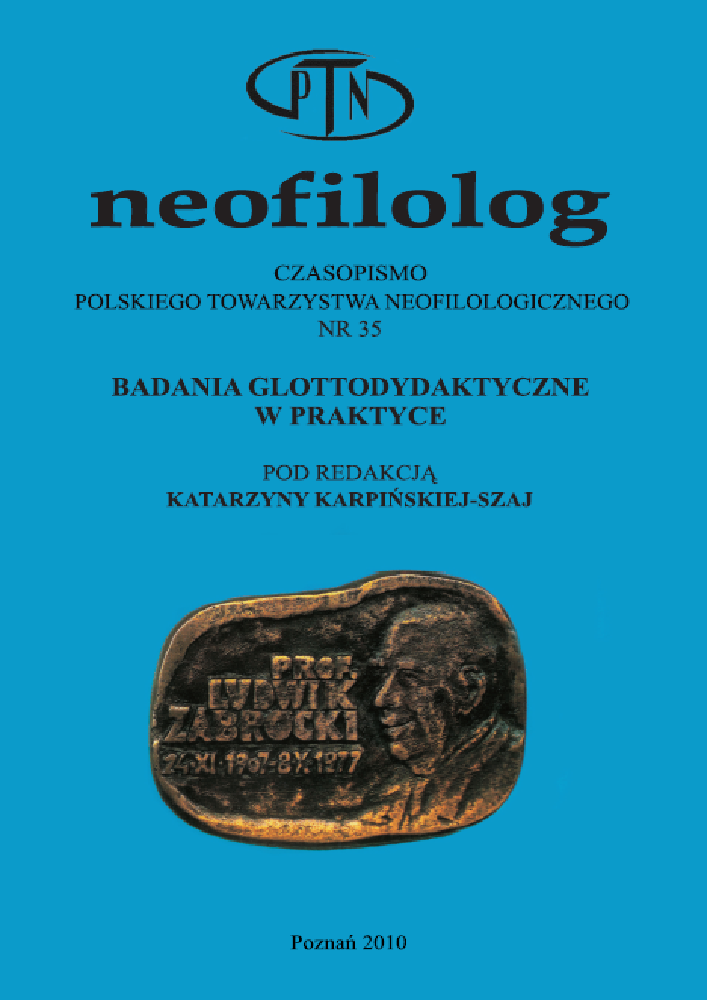Abstract
The aim of the present paper is to attempt to analyze selected factors which influence the learning of a second or foreign language. The goal is also to present the results of preliminary studies based on the observations of Russian language lessons. The introduction of a second foreign language into schools makes teaching multilingual. Students’ native language together with the languages they learn in and outside educational institutions all contribute to establishing a unique linguistic and cultural environment. The process of teaching and learning of a second language should refer to students’ knowledge and skills, which they acquired during their previous learning experiences.
References
Aleksandrowicz-Pędich, L. 2003. Literatura amerykańska w kształceniu nauczycieli języka angielskiego. Białystok: Trans Humana Wydawnictwo Uniwersyteckie.
Aleksandrowicz-Pędich, L. 2005. Międzykulturowość na lekcjach języków obcych. Białystok: Wydawnictwo Uniwersytetu w Białymstoku.
Camilleri, A. 2000. „The Development of cognitive processes” (w) Approaches to Materials Design in European Textbooks: Implementing Principles of Authenticity, Learner Autonomy, Cultural Awareness (red. D. Newby). European Centre for Modern Language. Graz. 13-14.
Europejski system opisu kształcenia językowego: uczenie się, nauczanie, ocenianie. 2001. Red. nauk. H. Komorowska. Warszawa: Wydawnictwo CODN.
Figarski, W. 2003. Proces glottodydaktyczny w szkole. Warszawa: Wydawnictwo Uniwersytetu Warszawskiego.
Grucza, F. 1978. „Ogólne zagadnienia lapsologii” (w) Z problematyki błędów obcojęzycznych, (red. F. Grucza). Warszawa: WSiP.
Karolczuk, M. 2006. Грамматическая интерференция в процессе обучения русской речи польских студентов-филологов. Białystok: Wydawnictwo Uniwersytetu w Białymstoku.
Łobocki, M. 1982. Metody badań pedagogicznych. Warszawa: Wydawnictwo naukowe PWN.
Okoń, W. 2003. Wprowadzenie do dydaktyki ogólnej. Warszawa: Wydawnictwo Akademickie „Żak”.
Romanik, A. 2008. „Rola anglicyzmów w kształtowaniu leksyki odzieżowej i ich adaptacja w systemie języka rosyjskiego”. Studia Wschodnioslowiańskie 8. 167-175.
Rubin, J. 1975. „What the „Good Language Learner” Can Teach Us”. TESOL Quarterly 1. 41-51.
Stern, H. 1985. „What Can We Learn from the Good Language Learner?”. The Canadian Modern Language Review 31. 304-318.
Sobolew, L. 1987. „Strategie uczenia się języka obcego”. Języki Obce w Szkole 5. 159-163.
Szulc, A. 1997. Słownik dydaktyki języków obcych. Warszawa: Wydawnictwo naukowe PWN.
Zawadzka, E. 2004. Nauczyciele języków obcych w dobie przemian. Kraków: Oficyna Wydawnicza Impuls.
Бим, И. Л. 2001. Концепция обучения второму иностранному языку (немецкий на базе английского). Обнимск: Титул.
Савчук, Е. А. 2004. Обучение испанскому языку как второму иностранному на базе французского в гуманитарном вузе неязыкового профиля. Москва: Автореферат диссертации кандидата педагогических наук.
Щепилова, А. В. 2000. „Реализация сопоставительного подхода при обучении французскому языку как второму иностранному (на базе английского)”. Иностранные языки в школе 2. 23-29.
License
Copyright (c) 2010 Marzanna Karolczuk

This work is licensed under a Creative Commons Attribution-NoDerivatives 4.0 International License.
Authors
Authors of texts accepted for publication in Neofilolog are required to complete, sign and return to the Editorial team’s office the Agreement for granting a royalty-free license to works with a commitment to grant a CC sub-license.
Under the agreement, the authors of the texts published in Neofilolog grant Adam Mickiewicz University in Poznań a non-exclusive, royalty-free license and authorize the use of Attribution-NoDerivatives 4.0 International (CC BY-ND 4.0) Creative Commons sub-license.
The authors retain the right to the free disposal of the work.
Users
Interested Internet users are entitled to use works that have been published in Neofilolog since 2017, under the following conditions:
▪ attribution – obligation to provide, together with the distributed work, information about the authorship, title, source (link to the original work, DOI) and the license itself.
▪ no derivatives – the work must be preserved in its original form. Without the author's consent, it is not possible to distribute the modified work in the form of translations, publications, etc.
Copyrights are reserved for all texts published since 2017.
Miscellaneous
Adam Mickiewicz University in Poznań retains the property right as a whole (layout, graphic form, title, cover design, logo etc.).
